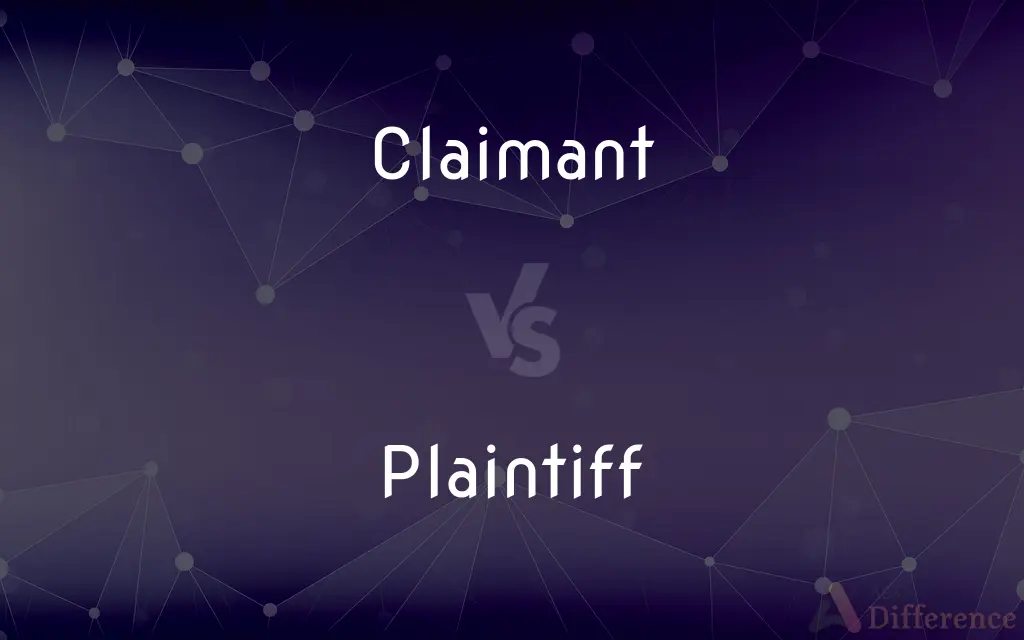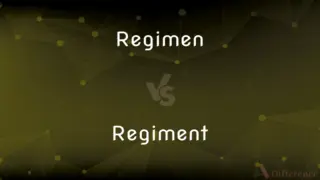Claimant vs. Plaintiff — What's the Difference?
By Urooj Arif & Fiza Rafique — Updated on March 6, 2024
A claimant seeks restitution or benefits in various legal contexts, whereas a plaintiff initiates a lawsuit in civil court.

Difference Between Claimant and Plaintiff
Table of Contents
ADVERTISEMENT
Key Differences
Claimants are individuals or entities asserting their rights to compensation, benefits, or other legal remedies in a variety of legal contexts, such as insurance or employment claims. These scenarios might not always involve a court case. On the other hand, plaintiffs are specifically involved in civil litigation, taking legal action against another party (the defendant) in court to seek a remedy for a grievance, injury, or dispute.
While claimants might navigate through administrative processes, negotiations, or arbitration to resolve their claims, plaintiffs engage in the judicial system, following formal litigation procedures and rules. This distinction highlights the different paths and settings in which claimants and plaintiffs seek redress.
Claimants often deal with organizations, government agencies, or insurance companies to resolve their claims outside of court, focusing on settlements or administrative hearings. Whereas plaintiffs usually confront the defendant in a court setting, aiming for legal judgments or settlements facilitated by the court system.
The terminology also reflects the scope of legal action; claimants may not always seek judicial intervention, relying instead on contractual or regulatory frameworks for resolution. Plaintiffs, by contrast, actively seek court intervention to resolve disputes, demonstrating the judicial nature of their claims.
The role of claimants can encompass a broader range of scenarios beyond disputes, such as applying for benefits or compensation under specific programs or policies, highlighting a more administrative aspect. Plaintiffs, however, are directly engaged in legal battles, emphasizing the adversarial aspect of their role.
ADVERTISEMENT
Comparison Chart
Definition
An individual or entity making a claim for compensation or benefits.
An individual or entity filing a lawsuit in civil court.
Context
Can be in or out of court, such as insurance or benefits claims.
Specifically in the context of civil litigation.
Interaction
Often with organizations, agencies, or insurers.
Directly with defendants through the court system.
Goal
Seeking resolution through administrative, negotiation, or arbitration processes.
Seeking a legal judgment or court-facilitated settlement.
Nature
Can be administrative or legal, depending on the context.
Inherently legal and involves formal litigation.
Compare with Definitions
Claimant
A party in a non-court dispute resolution.
The claimant negotiated with the insurance company for a higher settlement.
Plaintiff
An individual initiating a lawsuit in civil court.
The plaintiff sued the corporation for breach of contract.
Claimant
Someone asserting a right under a contract or policy.
The claimant filed a claim under the warranty for a defective product.
Plaintiff
A person or entity asserting a legal claim in litigation.
The plaintiff claimed that the defendant's negligence caused their loss.
Claimant
An entity requesting restitution or enforcement of a right.
The claimant sought compensation for damages from the city council.
Plaintiff
A party seeking legal remedy for a grievance.
The plaintiff sought damages for personal injuries sustained in a car accident.
Claimant
An individual seeking compensation or benefits.
The claimant applied for unemployment benefits after losing his job.
Plaintiff
An individual or group taking formal legal action for redress.
The plaintiffs filed a class action lawsuit for consumer fraud.
Claimant
A person involved in administrative hearings.
The claimant presented her case for disability benefits before the administrative judge.
Plaintiff
Someone filing a complaint against another in a court of law.
The plaintiff filed a defamation suit against the newspaper.
Claimant
A person making a claim, especially in a lawsuit or for a state benefit
One in four eligible claimants failed to register for a rebate
Plaintiff
A plaintiff (Π in legal shorthand) is the party who initiates a lawsuit (also known as an action) before a court. By doing so, the plaintiff seeks a legal remedy.
Claimant
A party that makes a claim, especially one that is legally cognizable.
Plaintiff
A person who brings a case against another in a court of law
The plaintiff commenced an action for damages
Claimant
One who claims; one who makes a claim.
Plaintiff
The party that institutes a suit in a court.
Claimant
(UK) A person receiving money from the government, in a form of unemployment benefits, disability benefits or similar.
Plaintiff
A party bringing a suit in civil law against a defendant; accuser.
Claimant
(legal) The party who initiates a lawsuit before a court.
Plaintiff
One who commences a personal action or suit to obtain a remedy for an injury to his rights; - opposed to defendant.
Claimant
One who claims; one who asserts a right or title; a claimer.
Plaintiff
See Plaintive.
Claimant
Someone who claims a benefit or right or title;
Claimants of unemployment compensation
He was a claimant to the throne
Plaintiff
A person who brings an action in a court of law
Common Curiosities
What types of disputes involve claimants?
Disputes involving insurance claims, workers' compensation, benefits applications, and contractual entitlements often involve claimants.
What is a claimant?
A claimant is someone who asserts a right to compensation, benefits, or other remedies, often in administrative or negotiation contexts.
Who is a plaintiff?
A plaintiff is an individual or entity that initiates a lawsuit in civil court to seek redress for a grievance or injury.
In what context do plaintiffs seek resolution?
Plaintiffs seek resolution in a court setting, aiming for legal judgments or settlements through formal litigation.
Is the role of a claimant limited to court cases?
No, the role of a claimant is not limited to court cases; it can also involve administrative processes and negotiations outside of court.
Can a claimant become a plaintiff?
Yes, a claimant can become a plaintiff if they decide to take their claim to court after unsuccessful resolution attempts.
What legal remedies can plaintiffs seek?
Plaintiffs can seek various legal remedies, including monetary damages, injunctions, and declaratory judgments.
Are claimants always seeking money?
While many claimants seek monetary compensation, others may seek non-monetary remedies such as benefits, enforcement of rights, or specific actions.
What distinguishes a plaintiff from a claimant?
The main distinction is that a plaintiff specifically initiates a lawsuit in civil court, whereas a claimant may seek resolution in various legal contexts.
Can organizations be claimants or plaintiffs?
Yes, both individuals and entities, such as organizations, can be claimants or plaintiffs depending on the context of their legal action.
Do all legal disputes involve plaintiffs?
No, not all legal disputes involve plaintiffs. Some disputes are resolved through administrative processes or arbitration without going to court.
What is the goal of a plaintiff in a lawsuit?
The goal of a plaintiff in a lawsuit is to obtain a legal remedy or compensation for a harm or grievance through the court's judgment.
What legal processes do plaintiffs follow?
Plaintiffs follow formal litigation processes, including filing a complaint, discovery, trial, and possibly appeals.
How do claimants resolve their disputes without going to court?
Claimants can resolve their disputes through negotiation, mediation, arbitration, or administrative hearings.
Can a dispute have both claimants and plaintiffs?
Yes, in some cases, a dispute can involve both claimants and plaintiffs, especially if a claim moves from an administrative or negotiation stage to formal litigation.
Share Your Discovery

Previous Comparison
Regimen vs. Regiment
Next Comparison
Relief vs. RelieveAuthor Spotlight
Written by
Urooj ArifUrooj is a skilled content writer at Ask Difference, known for her exceptional ability to simplify complex topics into engaging and informative content. With a passion for research and a flair for clear, concise writing, she consistently delivers articles that resonate with our diverse audience.
Co-written by
Fiza RafiqueFiza Rafique is a skilled content writer at AskDifference.com, where she meticulously refines and enhances written pieces. Drawing from her vast editorial expertise, Fiza ensures clarity, accuracy, and precision in every article. Passionate about language, she continually seeks to elevate the quality of content for readers worldwide.














































